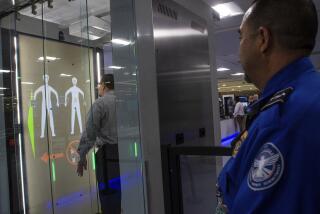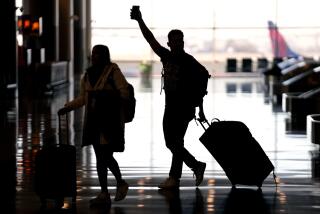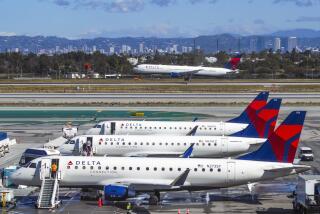FAA Upgrades Standards for Airport Security Staffs
- Share via
WASHINGTON — The Federal Aviation Administration Monday stiffened its hiring, training and performance standards for airline and airport security personnel, including the employees who screen passengers and luggage for weapons and explosives.
The new rules are required under aviation safety legislation passed by Congress last year.
For the screeners, the largest group of full-time aviation security employees, the new rules require a high school degree, a general equivalency diploma or other education and experience judged to be adequate for the job.
Other entry-level requirements include the ability to speak, read and write English, good eyesight and hearing, good color perception and physical dexterity.
In addition to receiving initial training, the screeners will be required to take recurring and specialized training sessions. A screener who fails an operational test will have to undergo remedial training before resuming screening.
A security official will be required to make an annual evaluation of each screener’s abilities, skills and performance.
Employers will have to limit the time a screener works at an X-ray screening station to make sure that fatigue does not diminish alertness, the FAA said.
Tim Neale, a spokesman for the Air Transport Assn., an airline industry group, said the association had recommended such rules.
In general, the screeners are not unionized.
The FAA is also requiring that each airport establish a security training program for employees who need airport-issued identification cards that authorize access to security areas.
New employees will have to complete the program before they get a card. Employees already on the job will have to complete it during the next two years.
Bill Jackson, head of security for the Airport Operators Council International, said he had not seen the new regulations.
“We don’t have any problem with the necessity to train the screeners and some of those people,” he said. He added that the organization had been concerned about the training requirements for getting an identification card.
However, he said: “We have a very short training program at every airport that issues an identification badge anyhow, explaining what the identification badge is, how it’s used, what they should do with it, what’s expected of them and what they in turn should expect.
“I imagine some airports may have to modify their program slightly, but I don’t think it will cause any great ruffle,” Jackson said.
More to Read
Sign up for Essential California
The most important California stories and recommendations in your inbox every morning.
You may occasionally receive promotional content from the Los Angeles Times.












